Blog

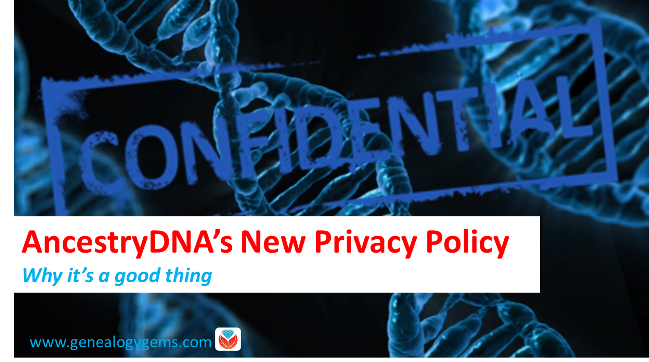
AncestryDNA Privacy Policy Update: Why This Change Is Good
An update to AncestryDNA’s privacy policy requires us to take to take one more step when managing someone else’s DNA test. Here’s why Your DNA Guide Diahan Southard thinks that’s a good thing.

Like many teenagers, my 14-year old sees every situation only from her own point of view. I call it myopic-itis. This is, of course, how most of us react to every new situation. The difference between those suffering from this condition and the rest of us is that fairly quickly, perhaps once the shock has subsided, we can see things from the point of view of others, and can therefore be more understanding about the whole situation.
AncestryDNA recently caused an attack of myopic-itis when they announced a change to their policy on how DNA tests are registered. Previously, you could register anyone’s test under your own account. Say you were gathering the test for an aged aunt or disinterested cousin. You handle everything from the order to the test registration to managing all correspondence. Your aunt or cousin merely needed to spit in the tube.
However, effective today, July 18, 2017, that has changed. Each person who takes an AncestryDNA test must have their very own account at AncestryDNA.
A natural reaction is to immediately reject this as a terrible idea that will certainly slow–if not halt–your efforts to gather the needed genetic information from your less-than-enthusiastic relatives. Your myopic-itis flares up and threatens to cause you to throw up your hands in frustration and just forget the whole thing.
But don’t! Really, all that is changed is that you have to take one more step when administering DNA tests for your friends or relatives: create AncestryDNA accounts for them. Then, they can assign you as the Manager of their DNA kits. Doing so allows their DNA results to show up in your Ancestry account, just as if you yourself had registered the test under your account. Viola! (Well, if your relative doesn’t have an email account, you may have to create one, so that would be one more step.)
Now, why would Ancestry decide to so inconvenience your life with another step or two? Well, to protect the rights of the cousin and the aunt that you are asking to take the test. It is that simple. Not that you would, but if the results are in your account, you can delete them, you can limit their access to them. In short, you have ultimate control. Causing each test to have its own account tries to put that control back in the hands of the test taker.
One of the criticisms of this announcement is that Ancestry is doing this just to make more people buy subscriptions to Ancestry. I don’t think this is their primary motivation. In fact, a blogger in the UK, Debbie Kennett, suggested that it may be partially in reaction to a new law in the UK that, starting next year, will require this personal access inr order for Ancestry to continue selling tests there.
But even if getting more subscribers was their primary motivation for the change, how is encouraging interest in genealogy a bad thing?! Think of it this way: let’s say you tell your cousins, “I got this. Don’t worry about anything. I will do it all.” Then they will let you, and they won’t take any ownership of the process or the results.
Instead, now you can say, “I have created a login for you at Ancestry so you can view your own results. I will also be able to see them in my account. I would love to go over them with you, if you are interested. But you can go in anytime and look around.” Then wouldn’t it be great if they really did that? Maybe they’d even get so interested that they’d decide to help you research?!
DNA is one of the biggest hooks we have to get our friends and family interested in family history. I think this change is just one more way that we can spread our love of family history with our family–not to mention protect their privacy and their rights.
In addition to Debbie Kennett’s post I mentioned above, make sure to read the official announcement by Ancestry, and these two blog posts about questions you may have: Reality Check–Changes at AncestryDNA and Managing Multiple Kits and the New AncestryDNA Change.
 Ready to test some relatives? Click here for tips on talking about DNA at your next family gathering (like, this summer’s reunion?). Then sign up for the free weekly Genealogy Gems e-newsletter and/or follow us on Facebook to learn about the fantastic DNA sales we’ve been spotting lately.
Ready to test some relatives? Click here for tips on talking about DNA at your next family gathering (like, this summer’s reunion?). Then sign up for the free weekly Genealogy Gems e-newsletter and/or follow us on Facebook to learn about the fantastic DNA sales we’ve been spotting lately.
What do you think about Ancestry’s new privacy policy? Join the conversation and leave a comment below.
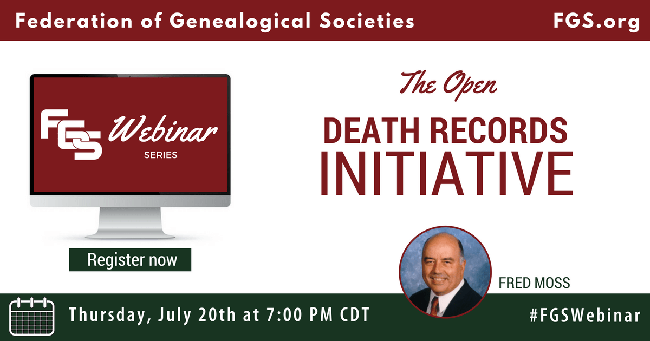
FGS Webinar Series on Society Management Begins Soon
The FGS Webinar Series on Society Management has just been announced and it’s starting soon. This new free webinar series is focused on the leadership and management of non-profit societies. If you belong to a genealogical society you’ll want to let your leadership know about this opportunity from the The Federation of Genealogical Societies. Read on for more from FGS.

FGS Webinar Series Details
Press Release: July 12, 2017 – Austin, TX.
The Federation of Genealogical Societies (FGS) announces the launch of their Society Management webinar series, scheduled to begin July 20, 2017. This series of free events will bring a much-needed aspect to the array of learning opportunities currently provided in the genealogical community, focusing solely on the leadership and management of non-profit societies.
The series will begin July 20, 2017 at 7:00pm central with a presentation by Fred Moss discussing The Open Death Records Initiative. The August session will feature David Rencher, CG, presenting on the best practices – and challenges – surrounding The Nominating Committee.
Each month thereafter will feature a new and interesting topic, ranging from recruitment and volunteer management to technology, publications, and working with your local tourism board. Registration will be necessary, and regular updates will be shared via the FGS Voice blog, FGS Voice Newsletter, and social media. Webinars will occur every 3rd Thursday of the month.
Registration for the July program can be found here.
Speakers interested in presenting topics should contact Jen Baldwin, Education Chair, at education@fgs.org.
More Support for Genealogical Societies
 Finding affordable quality programming is probably one of the biggest challenges genealogy societies face.
Finding affordable quality programming is probably one of the biggest challenges genealogy societies face.
Genealogy Gems for Societies is an annual premium subscription service just for genealogical societies and groups* (such as libraries). This is a cost-effective way for your group to provide quality family history video presentations by internationally-renowned speaker Lisa Louise Cooke at your regular meetings.
With a society subscription, your group may show video recordings of Lisa’s most popular classes! This applies to group presentations for a single location, one video per event–but with more than a dozen 50-60 minute videos, several more 25-30 minute videos and a growing number of quick video tips (4-15 minutes), you’ll have plenty of video classes to show all year long! Click here to see a full list of videos available to societies. (Videos are not for individual use by society members.)
In addition, society subscribers receive:
- Permission to republish articles from our extensive article archive in your society newsletter (your editor will LOVE this feature!)
- 10% discount for your society on live seminars by Lisa Louise Cooke
- 10% discount code for your society members to use in the Genealogy Gems Store (details will be sent to your society membership email address after purchase)
- BONUS: exclusive digital PDF ebook of a collection of Lisa’s most popular articles from Family Tree Magazine! Share this in the members-only section of your group’s website (or if you don’t have a members-only section, your Programming Director may keep it and enjoy).
All of this costs only $199.00 a year—about the cost of one typical webinar! Click here for more details and ordering information.
Please support your local genealogical society or group by sharing this post with them by email or social media. Thank you! You’re a Gem.
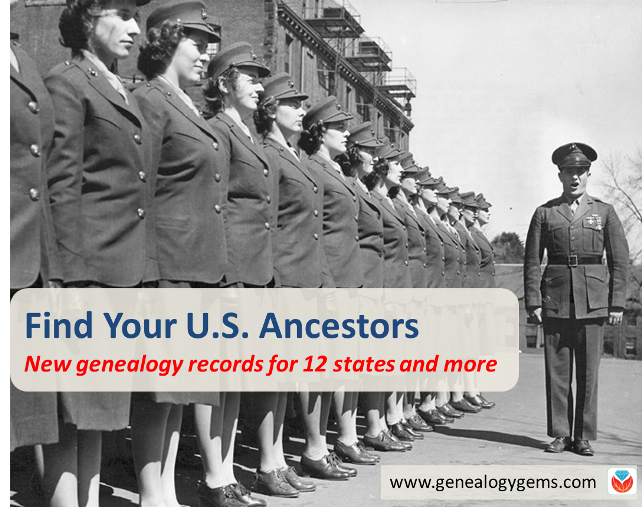
Find Your U.S. Ancestors in These New Genealogy Records Online
Learn more about U.S. ancestors in new genealogy records for Navy and Marine officers, WWI veterans, historical and genealogical journals, and new genealogy records for 12 U.S. states: Ala., Ark., Hawaii, Kan., La., Mass., Miss., Mont., N.Y., Texas, Utah, and Va.

Following are new genealogy records (and updated collections) for the U.S. and several U.S. states. In which may your ancestors appear?
U.S. Navy and Marine Corps Officer Registries. Ancestry.com subscribers may search a new database, “U.S., Navy and Marine Corps Registries, 1814-1992.” From the collection description: “This collection includes registers of officers of the US Navy and Marine Corps from between the years of 1814 and 1992. Within these records you can expect to find: name, rank, ship or station.” (Note: the above image shows the first group of female Marine officer candidates in 1943; click here to learn more and see this image’s citation.)
World War I Veteran’s History Project: Part II Launches. The Veterans History Project has launched “Over There,” the second in a three-part, online web series dedicated to United States veterans of the First World War. “Over There” highlights 10 digitized World War I collections found in the Veterans History Project archive. Click here to access Part II and other veterans’ collections featured in “Over There.” Part III will be available in fall of 2017. (Click here to read the full announcement from the Library of Congress.)
U.S. and Canada journals. 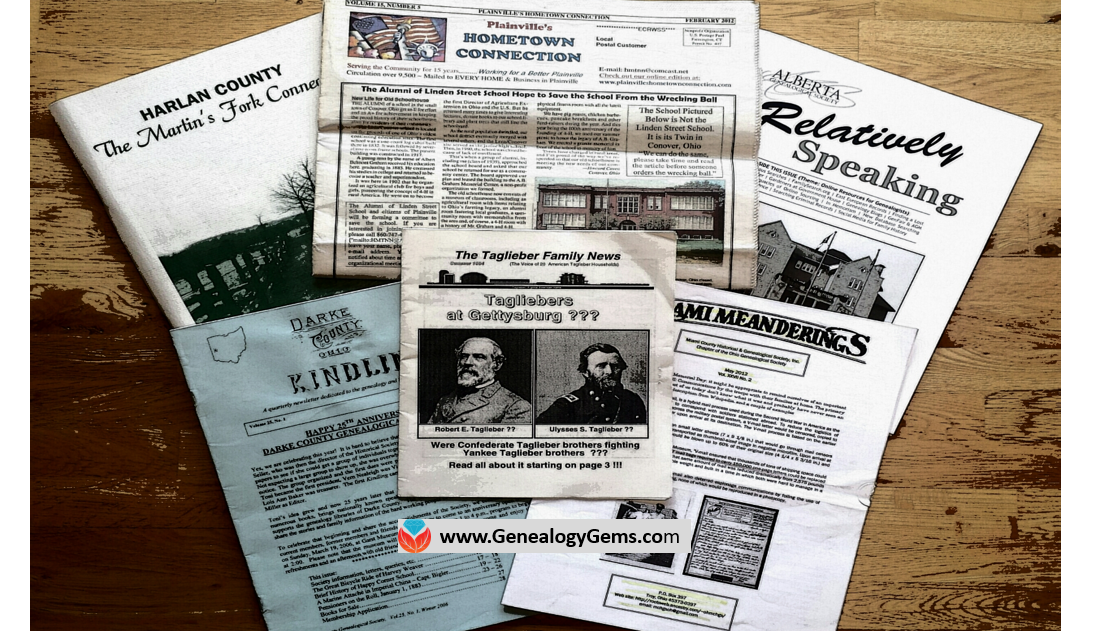 PERSI, the Periodical Source Index, has been updated with historical and genealogical journal content covering Ontario, Canada as well as Massachusetts, Minnesota, Missouri, Michigan, & Rhode Island. Search PERSI at Findmypast.com to discover articles, transcribed records, and images of your ancestors and their communities, churches, schools and more in thousands of journals. Some journals are index-only and others have digitized articles: click here to learn more about PERSI.
PERSI, the Periodical Source Index, has been updated with historical and genealogical journal content covering Ontario, Canada as well as Massachusetts, Minnesota, Missouri, Michigan, & Rhode Island. Search PERSI at Findmypast.com to discover articles, transcribed records, and images of your ancestors and their communities, churches, schools and more in thousands of journals. Some journals are index-only and others have digitized articles: click here to learn more about PERSI.
Statewide: New genealogy records
- Alaska: Ancestry.com has a new database of Alaska, Vital Records, 1818 -1963. It contains birth, marriage, and death records.
- Arkansas: A new digital exhibit tells the story of the first African-American college west of the Mississippi River, located in Phillips County. Lives Transformed: The People of Southland College “includes photos and scanned images of letters, circulars, forms, the Southland newspaper and other ephemera, including invitations, the catalog of studies, a diploma, and a commencement program,” states a news report.
- Hawaii: Over 300,000 indexed names have been added to a free FamilySearch.org collection of Hawaiian obituaries since 1980.
- Kansas: New browsable image collections of Kansas state census records for 1865, 1875, 1885 and 1895 are now free to search at FamilySearch.org. The growing size of each collection by year–from 4,701 pages in 1865 to 116,842 pages in 1895–witnesses the tremendous growth of this prairie state after the Homestead Act of 1862 opened its land for cheap purchase and settlement. (Did you know? Kansas census records 1855-1940 at Ancestry.com are also available for free to Kansas residents.) Click here to learn more about state census records in the U.S.
- Louisiana: Over 100,000 new images and thousands of indexed names have been added to FamilySearch’s free collection of Louisiana death records (1850-75, 1894-1960).
- Massachusetts: More than half a million names are in 22 volumes of sacramental records (baptisms, confirmations, marriages, deaths) for the Cathedral of the Holy Cross, Archdiocese of Boston, now online at AmericanAncestors.com.
- Mississippi: Ancestry.com has updated its collection of Mississippi Naturalization Records, 1907-2008. This collection pertains to naturalizations finalized after 1906, when most were taken care of in federal courts.
- Montana: Find a new collection of Montana County Marriages, 1865-1993 at Ancestry.com. Details for both the bride and groom may include name, age at marriage, and marriage date/place. (You may also access this collection for free at FamilySearch.org.)
- New York: The Leon Levy BAM Digital Archive has added more than 70,000 playbills, posters, and ephemera from the history of the Brooklyn Academy of Music, dating to the Civil War era. (We found this in a New York Times report.)
- Texas. Ancestry.com has updated its database, “Texas, Select County Marriage Records, 1837-2015.” The collection description states, “This collection consists of a mix of marriage licenses, returns, certificates, affidavits, and indexes. The documents that are available in this database vary depending on the county. All marriage records include the names of the bride and groom, as well as the date of the license and/or marriage. In many instances, additional details are available as well.” This collection continues to be updated: keep checking back!
- Utah: There’s a new digital archive of photos, yearbooks, and other documents relating to the history of Brigham Young College in Logan, Utah. The school taught high school and college courses and was open 1877-1926. Learn more about it in a news report at HJnews.com.
- Virginia: A decade’s worth of obituaries from the Evening Star (Winchester, 1899-1909) are now available at subscription site Findmypast.com.
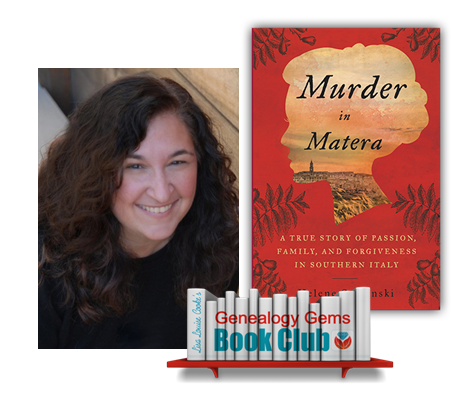 Did you see the new Genealogy Gems Book Club announcement for this week? It’s a new memoir by a U.S. journalist who tracks down an old family story about her immigrant roots. You won’t want to miss this family history murder mystery! Click here to learn more about the book and watch a trailer for its PBS documentary.
Did you see the new Genealogy Gems Book Club announcement for this week? It’s a new memoir by a U.S. journalist who tracks down an old family story about her immigrant roots. You won’t want to miss this family history murder mystery! Click here to learn more about the book and watch a trailer for its PBS documentary.
Disclosure: This post contains affiliate links and Genealogy Gems will be compensated if you make a purchase after clicking on these links. Thank you for supporting Genealogy Gems!




